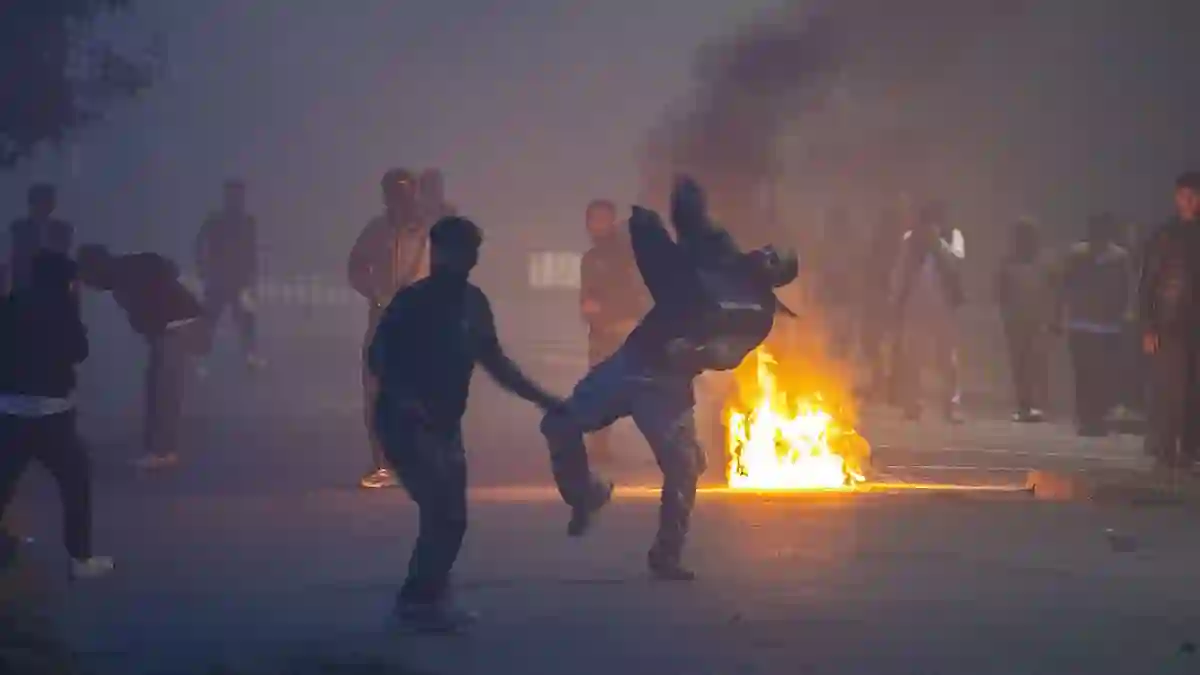What used to be a quiet, flower-decked coastal town in northern France has now become one of the most active launchpads for illegal migrant crossings to the UK.
Gravelines, known for its scenic canals and award-winning gardens, now finds itself at the heart of a growing and dangerous crisis—one that begins well before sunrise and ends with overloaded dinghies headed across the Channel.
Rioters Set Fire and Throw Rocks Over Confiscated Dinghy
Just before dawn, the calm of Gravelines was shattered by violence.
Around 50 rioters, shouting “Allahu Akbar,” pelted rocks and flaming debris at French police in riot gear.
The crowd turned on the car of a British photographer, hurling petrol containers and fireballs at it in hopes of an explosion.
Fortunately, the photographer managed to drive away safely as chaos unfolded behind him.
The reason for the unrest? French authorities had seized a rubber dinghy meant to carry 70 migrants to the UK—a loss of tens of thousands of euros for the smugglers.
With their boat gone, the gang disappeared into the dunes. No one was arrested.
Migrant “Taxis” Depart from the Middle of Town
This isn’t happening in some desolate corner of the coast.
It’s taking place right in the town center, in full view of restaurants and canals.
Just the day before, a 30-foot inflatable boat was quietly dropped into the water as men began boarding. These crossings aren’t secretive anymore.
One man even joked, “We are all the world,” as passengers from Afghanistan, Palestine, Eritrea, Vietnam, and Sudan climbed aboard.
For £1,500 a head, they’ll cross the Channel, with some hoping to reach Dover in time for a late breakfast.
The smugglers and migrants don’t even call them boats anymore—they call them “taxis.”
Bold Claims from Governments, But No Sign of Impact
Despite optimistic language at a recent summit between President Macron and UK Prime Minister Sir Keir Starmer, the scenes in Gravelines tell a different story.
New policies, like allowing French police to intercept dinghies 300 meters offshore and “one-in, one-out” asylum exchange plans, aren’t making any real difference.
Everyone from migrants to local officials agrees—the system isn’t working.
Expert migration lawyer Olivier Rangeon says the new offshore rule hasn’t even been approved by the European Commission.
And even if it were, French police say the crossings are too frequent and too dangerous to fully stop.
The Mayor Blames Britain’s “Pull Factor”
Bertrand Ringot, Gravelines’ long-time mayor and a Socialist Party member, says the UK itself is the draw.
“Britain needs more severe rules,” he says, calling for mandatory ID cards and tougher work permit laws.
“The only way to fix this is to make Britain less attractive to illegal migrants.”
Chaos on the Water as Smugglers Fumble Launch
One morning, a smuggler with clearly no boating experience smacked a 30-foot dinghy straight into a canal wall as men tried to jump in.
With the engine roaring at 40 horsepower—well above legal limits—the boat finally managed to limp away just as police sirens flashed nearby.
The boat headed toward Plage de Petit-Fort-Philippe, a two-mile beach flanked by dunes and bushes, right beside France’s largest nuclear power station—an eerily symbolic location for this crisis.
One Family’s Dangerous Journey Across the Channel
Among the crowd that morning was a young Iranian family: Karwan, Sara, and their two children, aged six and four.
Unlike the others, they weren’t full of bravado.
Sara was in tears. The family had spent a week living in the dunes, waiting for their chance.
Smugglers helped carry the children into the boat.
An hour later, it was filled with migrants and ready to leave—again, with no police in sight.
The only authorities on scene, a French coastguard boat, didn’t check the driver’s papers.
Instead, they offered extra lifejackets.
The Boat Reaches Britain—With No Interference
By 10:35 AM UK time, the Mail spotted the same Iranian family disembarking at Dover Harbour from a British Border Force boat.
They’d made it. The British government later confirmed that six boats carrying nearly 400 people had arrived that morning.
At Migrant Camps, Hope and Danger Go Hand in Hand
Back in the woods near Loon-Plage, Sudanese migrant Ahmed Babeker, 24, waited patiently for the final funds from his family to be transferred through the hawala system.
He’s been living in rough conditions since November, including in an area where a Yemeni man was recently shot and a photographer chased off at knife point.
Despite all that, Ahmed is cheerful. He dreams of becoming an electrical engineer in the UK.
In a smaller camp near Calais, another Sudanese man, Salah Abdul Salam, has already been granted asylum in Sweden, where he once worked at McDonald’s.
But he’s tired of the cold. “Sweden is too cold.
I want to go England,” he says, showing off his official Swedish documents.
A Mayor’s Warning About a Brewing Time Bomb
Mayor Ringot says the ongoing crisis is straining his town’s budget and testing public patience.
It’s costing €300,000 a year just to clean up the mess.
Buses, which are free, are now considered unsafe by many women due to roaming gangs of migrant youths.
Locals are angry about strangers peering through windows and collecting firewood in their gardens.
“My message to Starmer is clear,” says Ringot. “Change the conditions for staying in England.
Make it harder to work without documents.
This is a time bomb.”
French Laws Exist—But They’re Rarely Enforced
One of the most baffling aspects is how existing French laws—like requiring licenses for boat engines over six horsepower—are routinely ignored.
Last year, the reporter himself was fined €320 in Sicily for sailing into the wrong zone.
Meanwhile, in Gravelines, a 40-horsepower smuggler boat gets a coastguard escort.
This is more than a two-tier justice system. It’s a tale of two very different beaches—“deux étages plages”—where the rules apply differently depending on who you are and what you’re sailing.
